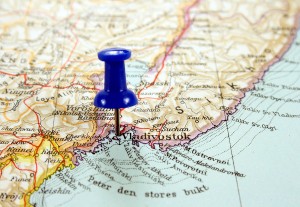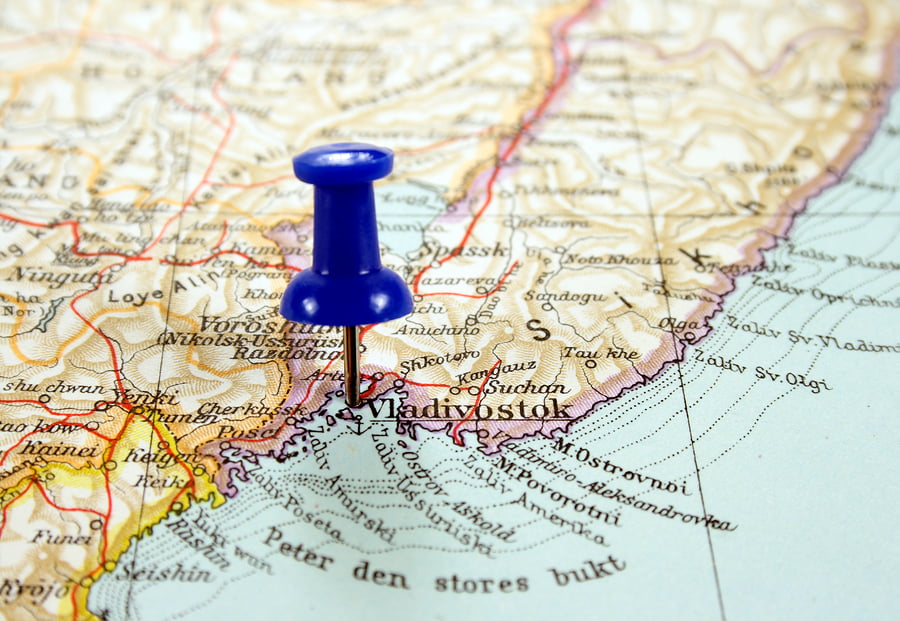2012-08-30 By Richard Weitz
Relations between Russia and Japan have remained strained throughout the post-Soviet period.
Despite the end of the Cold War, Moscow and Tokyo have been unable to resolve their territorial dispute over what the Russians call the Southern Kurils and the Japanese label their Northern Territories.
The 1875 Treaty of St. Petersburg ceded all the Kuril Islands to Japan while assigning the Sakhalin Island to Russia.
At the end of World War II, the Soviet military occupied the four disputed islands of Kunashir (the southernmost Island, known in Japanese as Kunashiri), Iturup (Etorofu), Shikotan and Habomai. The Soviet government then expelled most of the original inhabitants and established military bases and other settlements in their place.

The Russian government justifies its possession of the islands by citing several World War II agreements. The Japanese government’s position is that, while Tokyo did cede control of the Sakhalin and Kuril Islands to the USSR under the 1951 San Francisco Peace Treaty, which the Soviet government never signed, the treaty’s provisions did not apply to the four islands of the Northern Territories because Tokyo has never recognized them as part of the Kuril chain. One of the islands is located only 10 miles (15 km) from Japan’s northernmost island of Hokkaido.
Various proposals to divide control of the islands or establish a creative shared sovereignty arrangement have never gained decisive support in both governments simultaneously. Whenever one side seemed prepared to make a deal, the other party declined in the end to endorse it.
In 1956, for instance, Soviet leader Nikita Khrushchev proposed returning two of the four Kuril Islands (Shikotan and Haboma) to Japan in exchange for a bilateral peace treaty. Tokyo declined the gambit, which would have involved only seven percent of the total area in dispute, choosing instead to sign a bilateral security agreement with the United States.
The 1956 Joint Declaration between Japan and the Soviet Union ended the state of war between the two countries and restored commercial and diplomatic ties between them, but the unresolved sovereignty dispute has prevented their signing a formal peace treaty, leaving the Russia-Japan dispute as the only legally unsettled conflict from World War II.
Soviet leader Mikhail Gorbachev informally attempted to renew Khrushchev’s proposal in 1987 and 1988, but the Japanese government continued to demand that Moscow recognize Tokyo’s sovereignty over all four islands.
Following the Soviet Union’s disintegration, and the departure of many Russian soldiers and other nationals from the country’s Pacific islands, both Presidents Boris Yeltsin and Vladimir Putin discussed a possible arrangement that would involve the transfer of several but not all the islands. The Russian and Japanese governments even established a joint commission to resolve the dispute, but the deadlock persisted.
In 2004, Russia Foreign Minister Sergei Lavrov announced that the Russia Foundation, as the legal successor to the USSR, would honor the 1956 Soviet-Japanese Joint Declaration.
When Yeltsin visited Japan in 1993, expectations were high that bilateral relations would strengthen with the end of the Cold War, as had occurred with Russia’s western neighbors. The two governments signed a joint statement calling for closer Russia-Japan cooperation.
This 1993 Tokyo Declaration defined the common principles that would govern bilateral peace treaty negotiations. For example, the two sides agreed to try to resolve the issue of the four islands’ attribution on the basis of historical and legal facts. They also committed to adhere to the principles of law and justice.
In the end, Yeltsin and Japanese Prime Minister Ryutaro Hashimoto developed strong personal ties, but no significant progress was made resolving the islands issue. The Russian and Japanese governments have established a joint commission to resolve the dispute, but their deadlock persisted.
Before 2008, some Japanese analysts had hoped that they could wait out Putin’s presidency, and deal with a more pliant successor. The expectation was that, with new Russian leadership, the two governments could reach a settlement at the sidelines of the July 2008 G8 summit, which occurred on Hokkaido Island, which is located near the Kurils.
But Putin’s decision to become prime minister after leaving the presidency, combined with the selection of his mentor Medvedev as his successor, has meant that the current government still aggressively defends Russia’s territorial claims.
In February 2009, Putin told Prime Minister Taro Aso said he would pursue a “creative and flexible approach” to the Russian-Japan territorial dispute, but nothing concrete developed after this exchange.
If anything, Medvedev adopted an even harder line than Putin toward the islands.
In November 2010, Medvedev broke decades-long precedent and visited Kunashiri Island, becoming the first Russian (or Soviet) head-of-state ever to visit one of the disputed islands.
Moscow leaders had always avoided such a provocative act for fear of antagonizing Japan, but Medvedev must have calculated that the weak Japanese government would not respond too strongly to his reawakening the 65-year old dispute given Tokyo’s troubles with China, North Korea, and potentially other neighbors.
In addition, Russian policy makers appeared irritated that Tokyo’s policy toward the islands has not changed despite expectations that a government led by the Democratic Party of Japan would pursue more moderate policies.
In deciding to break with precedent and become the first Russian head of state to visit the contested islands, Medvedev may have calculated that the Japanese government, led by Prime Minister Naoto Kan, would not respond too strongly to his reawakening the 65-year old dispute.
Japanese commentators had repeatedly been describing their government as weak and ineffective, and had highlighted the increasing strains between Japan and the United States as well as with China, North Korea, and other neighbors.
In addition, although the United States has committed to defend Japan under the 1960 Japan-U.S. security treaty, U.S.-Japan ties had only recently recovered from the year-long struggle with over the relocation of U.S. Marine Corps Air Station Futenma in Okinawa.
Indeed, the Kan government did not respond very strongly to Medvedev’s move.
Although Japanese officials warned the Russian governments against making the trip when Medvedev first indicated that he might visit the islands, their response after the fact was very restrained. Foreign Minister Seiji Maehara simply delivered a note of protest to Russia’s Ambassador to Japan. The Japanese government also recalled its ambassador to Russia back to Tokyo for consultations.
Very rapidly, though, Japanese officials adopted a damage limitation strategy.
Anonymous Japanese officials told the Japanese press—with the presumed expectations that the Russians would hear their message—that they would not take any further actions provided that Moscow also refrained from further provocations.
While some Japanese analysts saw Medvedev’s action as reflecting Russian-Chinese collusion to apply concerted pressure on Tokyo regarding their hitherto separate territorial disputes, Japanese government leaders suggested that domestic political considerations rather than a desire to coerce Japan prompted Medvedev’s unusual move.
They also made clear they still wanted Medvedev to attend the mid-November 2010 Asia-Pacific Economic Cooperation (APEC) summit in Yokohama, which Prime Minister Kan wanted to be a high-profile success to address complaints that his government lacked major diplomatic achievements.
Even this mild Japanese response provoked a testy Russian reaction.
Foreign Minister Lavrov shot back that Medvedev intended to make further trips to the other disputed islands and that Tokyo had no grounds to complain about where the President of Russia went in his own country’s territory. The Foreign Ministry also issued a formal statement in which it “categorically rejected” what it called the “Japanese demarche.”
Medvedev and Kan met in a bilateral session on the opening day of the APEC summit. The two defended their positions on the territorial dispute, but Kan agreed to consider Medvedev’s invitation to visit Russia next year. More importantly, both leaders agreed to set the territorial controversy aside and focus on developing their economic relations.
Although Japanese firms had no economic presence on the islands themselves due to the Japanese government’s guidance to avoid such activities, they feared that patriotic Russian consumers would boycott their goods.
But Japanese commentators noted that Russians could have even less reason to settle the territorial dispute if they were able to receive additional Japanese economic help without making further concessions.
The current Russian position seems well reflected in the statement of RIA Novosti columnist Ilya Kramnik, who says Japanese leaders need to understand “that Japan can gain sovereignty over the islands only if its starts and wins a war against Russia.”
One result of this incident was to encourage the ruling Democratic Party of Japan, whose leaders came into office the previous year originally hoping to improve ties with China and reduce Tokyo’s reliance on U.S. military ties, to return to Tokyo’s traditional strategy of relying heavily on the United States to backstop Japan’s security and diplomacy.
In return, U.S. officials have declared their support for Tokyo’s position in its territorial dispute with Moscow.
Still, the Obama administration, unlike U.S. governments during the Cold War, is not eager to confront Russia over the disputed islands, especially when Moscow’s help is needed to manage North Korea’s provocative policies and steer China’s rise in peaceful directions.


